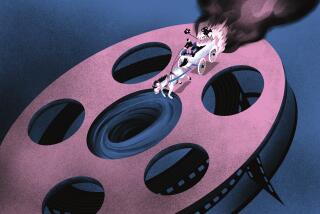Movie review: ‘Meek’s Cutoff’
- Share via
Indie director Kelly Reichardt always brings an artistic eye to her films, though never more so than in the minimalist beauty and stark realism of “Meek’s Cutoff.” Hers is an unforgiving Old West pared to the bone — a lyrical poem for some, like watching paint dry for others. I’d argue for embracing the poetic, a rare commodity in American films these days.
Set on the Oregon Trail, circa 1845, it is a story of hardships, hopes and the road not taken as three pioneering families hitch their future to a mountain man promising a shortcut over the Cascade Mountains. There are echoes of westerns past in the worn calico dresses, the questions of fate, the fierce drive of the dispossessed, but none of the shootouts, saloons and sheriffs that usually brand the drama. There are showdowns, but of a very different sort.
Much of the experience of “Meek’s” lives in the ambient sounds of the journey. One of the first is the knife of Thomas Gately (Paul Dano) carving the word “Lost” into what’s left of a fallen tree, bleached white by the sun. The squeak of a wagon wheel will soon become familiar, as will the song of a canary one of the women has brought along, a sweet sign of optimism but for the nagging sense that like one in a coal mine, it may portend things to come.
This excellent ensemble of character actors is anchored by Michelle Williams as Emily Tetherow, a wary young woman who’s come west with her older husband, Solomon (Will Patton). Zoe Kazan plays Gately’s wife, Millie, as flighty as the yellow bird she’s brought along. Shirley Henderson is a very pregnant and very grounded Glory White, there with her husband, William (Neal Huff), and son Jimmy (Tommy Nelson).
Though the land is hard, the decisions facing them are harder still, with the film hanging on whom you ultimately trust with your life. In this case, neither choice is comforting. There’s the rough rapscallion Meek, a grizzled Bruce Greenwood, who fills the campfire nights with fearsome tales of the prairie. The other is the Indian (an enigmatic Rod Rondeaux, all cheekbones and silence) captured by Meek and Solomon not long after the film opens and pressed into guiding the group toward water.
Working with her frequent collaborator, screenwriter Jon Raymond, as she did in the critically acclaimed “Wendy and Lucy” in 2008 and “Old Joy” in 2006, Reichardt has stripped “Meek’s” down to bare essentials and careful emotions. The cast captures that quality beautifully — like the water that is running out, everything is conserved. It makes the frustration and tears more powerful when they come, though pragmatism is more the rule of the day.
In Emily, the movie’s quiet force, Williams adds another to a string of distinctive characters and fine performances, including her Oscar-nominated portrayal of a young wife in a fracturing marriage in last year’s “Blue Valentine.” This is her second collaboration with Reichardt, who seems to know how much the actress can do with a little. Emily says everything about Meek when she takes his measure with just the slightest narrowing of her eyes.
There are big themes running through the short span of days on the trail that make up the story. Though survival is chief among them, the question is more how you go about it than whether you succeed. It is an era when men made the decisions and women did much of the work. Their place as prescribed by the times, and their subtle resistance to it, is caught with as much grace as the parched earth, wildflowers and sage by cinematographer Christopher Blauvelt, a veteran camera operator making his feature film debut here. But then the details are carefully tended by everyone, including costumer Vicki Farrell, production designer David Doernberg and composer Jeff Grace.
The perspective swings between extremes. Wide shots underscore just how vast the desolation is and how insignificant the pioneers; the tight shots bring us close enough to see the sweat on the back of the oxen, dust streaked on sunburned faces. The indecision as things go from bad to worse is mostly overheard — whispers between husbands and wives, snatches of conversations between the men over whether to stay the course or turn back, sharp words between Emily and Meek.
Reichardt is always fascinated by the way the real world collides with human nature. Here the power struggle unfolds around the Indian, whether he is a savage better dispensed with, or a savior who can lead them to water. The poetry here is written in the grit of the plains, on the backs of the people who would cross it. Nearly perfect.
More to Read
The biggest entertainment stories
Get our big stories about Hollywood, film, television, music, arts, culture and more right in your inbox as soon as they publish.
You may occasionally receive promotional content from the Los Angeles Times.











